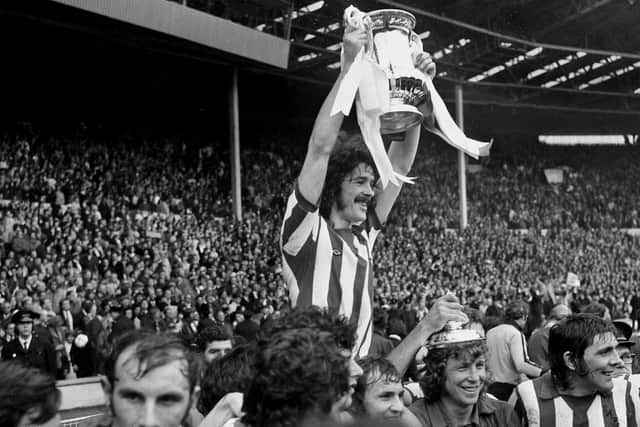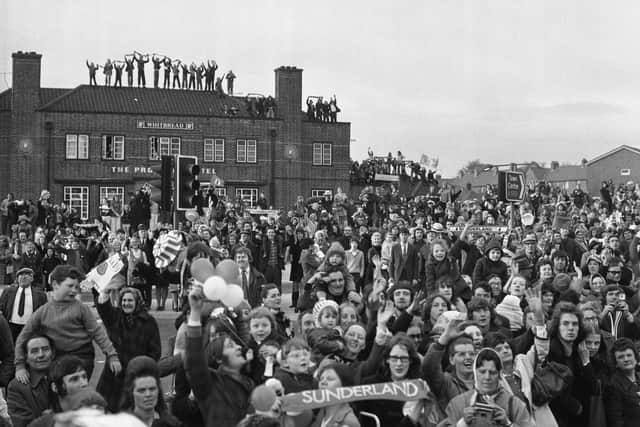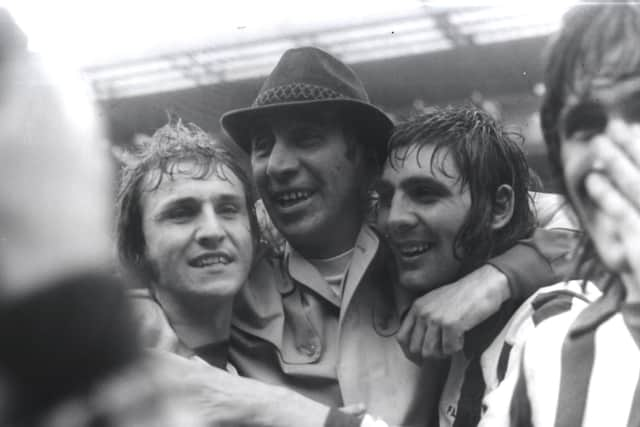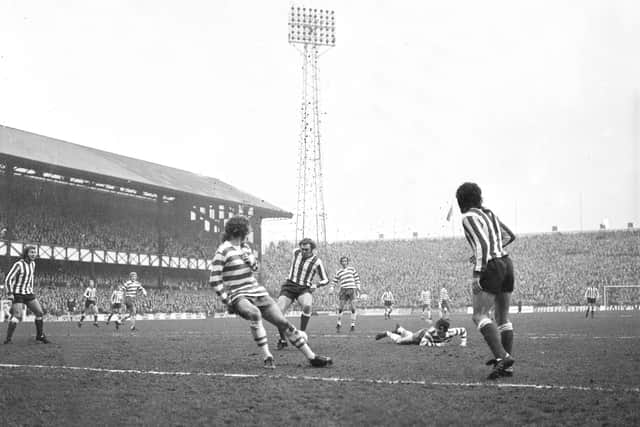The story of Sunderland's amazing 1973 FA Cup Final victory
and live on Freeview channel 276
In overcoming the fabled Leeds United side constructed by Don Revie, the Black Cats under manager Bob Stokoe etched their forever into footballing folklore.
In doing so, they also joined a select group of teams from outside the top flight to lift the world’s oldest domestic knockout trophy.
Advertisement
Hide AdAdvertisement
Hide AdThe win remains the Black Cats’ last triumph in a major competition - although they’ve come close since, in the FA Cup and the EFL Cup.


What happened in the 1973 cup final?
Despite their storied history as the Bank of England team, Sunderland, then in the second tier of English football, were very much the minnows next to Leeds.
Revie’s side boasted 10 internationals in a side which had won the first division title under his tenure and played extensively in Europe.


Stokoe, meanwhile, had taken over at Roker Park mid-season with the club third from bottom.
Advertisement
Hide AdAdvertisement
Hide AdBut after kick-off at Wembley on May 5, 1973, Leeds struggled to make the most of chances before Ian Porterfield put the Wearsiders ahead, scoring off the back of a Billy Hughes corner.
The Peacocks hit back with a vengeance, but two moments of magic from Sunderland keeper Jimmy Montgomery saw him produce a double save, first parrying a Trevor Cherry header into the path of Peter Lorimer and then recovering to deny the Scottish midfielder.
Unable to find an equaliser, the final whistle saw the North East side emerge victorious, with manager Stokoe’s celebratory run across the pitch in trademark mackintosh and trilby immortalised in a statue outside the Stadium of Light.


Who did Sunderland beat on their way to the final?
The Black Cats’ run to glory started in January, 1973, with a 1-1 draw away to Notts County in the third round, watched by about 15,000 fans.
Advertisement
Hide AdAdvertisement
Hide AdThe Roker Park replay three days later saw attendance almost double as the home side played to a 2-0 win.
In what became a theme of the campaign, the Wearsiders were next held 1-1 by visitors Reading, later despatching the Royals 3-1 in the replay at Elm Park.


Next up was a Manchester City side which had seen off league leaders Liverpool in the previous round.
Once again, a draw, at Maine Road, was followed up with a 3-1 victory in the replay back in Sunderland, this time in front of more than 50,000 fans.
Advertisement
Hide AdAdvertisement
Hide AdFor once, the Black Cats only needed one try to get through the sixth round, with a home win against Luton Town, who had previously dumped Tyneside rivals Newcastle United out of the competition.
A tie against Arsenal at Hillsborough, in Sheffield, marked Sunderland’s first FA Cup semi final in 17 years, with the Gunners shut out until six minutes from the end, leaving the final score 2-1 to the eventual champions, setting up a final against Leeds United.
How much of a ‘cupset’ was Sunderland’s victory?
In lifting the 1973 FA Cup, Sunderland became the first second division side to win the FA Cup since West Brom in 1931.
West Ham’s 1980 victory made them the most recent additions to the select group of FA Cup winners from outside the top flight, including Notts County (1894); Wolverhampton Wanderers (1908); Barnsley (1912); West Bromwich Albion (1931) and Southampton (1976).
Advertisement
Hide AdAdvertisement
Hide AdTottenham Hotspur technically won as a non-league side in 1901 while playing in the Southern League and were only elected to the Football League in 1908.
In 2013, Wigan Athletic achieved the dubious distinction of becoming the first team to win the FA Cup and be relegated in the same season.
What happened after the final?
Bob Stokoe stayed at the helm, guiding Sunderland to promotion from the second division in 1976, but left the following season.
After spells managing Blackpool, Rochdale and Carlisle, he briefly returned to Wearside for a stint as caretaker in the 1980s.
Advertisement
Hide AdAdvertisement
Hide AdJimmy Montgomery, whose double save has been hailed one of the best ever, left Wearside, but later returned as club goalkeeping coach.
In 2016 he was awarded the freedom of the city alongside Hays Travel founder John Hays, an honour previously conferred on Stokoe and the club.
This is also due to be extended to the rest of the squad which made it to Wembley, although two players - Billy Hughes and goal scorer Ian Porterfield - have died.
Micky Horswill has also served the city as mayor’s consort.
Following the famous match, Leeds travelled to Greece for the European Cup Winners' Cup Final, where they were beaten again, by AC Milan.
How have Sunderland fared in cup finals since?
Advertisement
Hide AdAdvertisement
Hide AdThe Wearsiders were unable to recreate the magic of 1973 when they were once again the minnows in an FA Cup final tie against Liverpool in 1992.
But despite being beaten 2-0, thanks to goals from Ian Rush and Michael Thomas, the Black Cats still managed to collect winners medals, thanks to a mix up during the trophy presentation.
Hopes were raised in 2014 when Fabio Borini briefly put his side 1-0 against Manchester City in the League Cup final, before North West stars Yaya Touré, Samir Nasri and Jesús Navas struck to end the game 3-1.
But there was better luck last year, as Sunderland lifted the Papa John’s Trophy following a 1-0 win over Tranmere Rovers, while celebrations saw the takeaway chain cleared out by celebrating fans.
